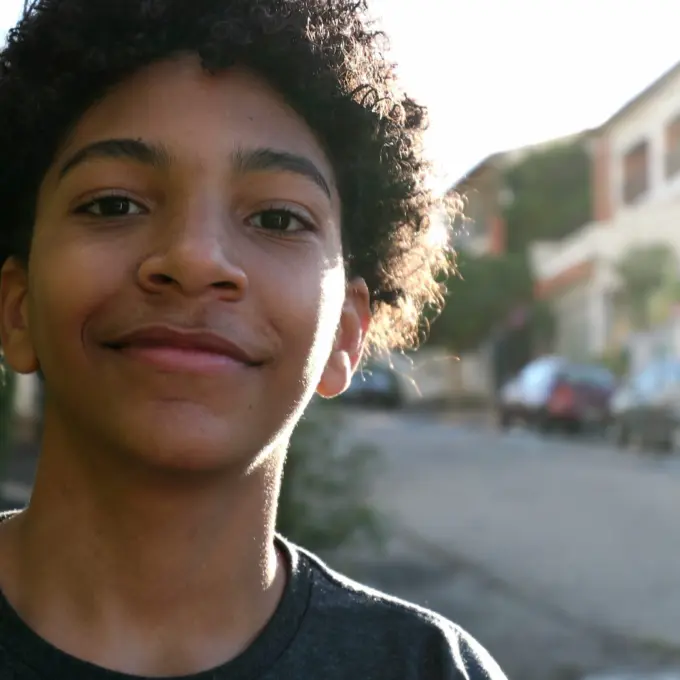
Overlooked & Forgotten
Safer London, in partnership with the UCL Psychoanalysis Unit and Child Bereavement UK, is proud to present Overlooked & Forgotten: Ensuring Adequate Bereavement Support for Everyone Affected by Youth Violence and Trauma. This important research set out to explore whether the current bereavement support services are equipped to meet the needs of those who have lost a loved one to youth violence-related murder.
The impact of youth violence murder extends deeply into the lives of families, friends, and communities, creating a ripple effect of trauma and grief. Often, those affected struggle to find the support they need during such devastating times.
When Karen Green Stewart lost her son Lamar to youth violence, she was shocked to encounter layers of red tape in accessing support for those outside his immediate family. His best friend, cousins, and even the shopkeeper who saw him every day – who all had strong connections with Lamar - were never offered bereavement support. Despite her advocacy for their inclusion, Karen's efforts were often dismissed.
Karen Green Stewart
In the case of my son Lamar there was no bereavement support offered to extended members of the family such as his cousins, as well as his friends, neighbours, or the shopkeeper that saw him almost every day. All these people had a relationship with him for his whole life, but there was nothing.
In 2022, Karen brought her concerns to Safer London. She shared her experiences of bereavement and highlighted the lack of appropriate support for families and the wider network in similar situations. Spearheading this research from the start, Karen emphasised the urgent need for collaboration to better understand the challenges faced by grieving families and explore effective solutions.
Watch the video to discover Karen's story, motivations and aspirations.

Our goal with this research was to assess existing support systems for all those affected by this type of tragedy and determine their adequacy, so in turn we could inform a new support model shaped by the authentic voices and experiences of those directly impacted by youth violence.
The second phase research was conducted through semi-structured interviews, lasting between 18 minutes and 1 hour 17 minutes, led by the UCL Psychoanalysis Unit in close collaboration with Safer London. Between May 2023 and March 2024, 24 participants took part, including 3 mothers, 2 fathers, 4 siblings, 14 extended family members, and 1 peer. an additional 4 months took part in the first phase of the research via focus groups in the summer of 2022.
To ensure emotional safety, participants were offered support from a specialist bereavement advocate before and after the interviews, with long-term support made available as needed. The findings from these conversations were grouped into three key areas: suggestions for developing new services, reflections on the support received, and participants' responses to the interview process.
These insights have been instrumental in developing a deeper understanding of the needs and challenges faced by those bereaved through youth violence.
Key Findings:
- Complexity of Grief: The research emphasised the overwhelming complexity and depth of grief experienced by those affected by youth violence-related homicide.
- Inadequate Support: Families, friends, and communities often felt isolated, with services either hard to access or simply not meeting their needs. Many participants were unaware of existing services, and for siblings and peers, available support was especially lacking.
- Gaps in Support: Young people and men, in particular, were identified as facing significant gaps in available support, often left to navigate their grief in silence.
- Family-Provided Support: In the absence of adequate services, families frequently stepped in to provide emotional and informal bereavement support. This was especially true in Black communities, where family support plays a crucial role, though it can sometimes place strain on relationships.
Recommendations for a service
These recommendations have been informed by the participants who took part in the research. By listening to their experiences, and opinions, and through robust analysis, it was indicated that a bereavement service or support should:
Be consistent, transparent, and flexible
A bereavement support service for those affected by youth violence must be consistent, transparent, and flexible to accommodate the complex and often lengthy grieving process.
Consistency in support includes being easily accessible and available whenever needed. The service should be transparent about what it can offer, ensuring those in need can readily contact and communicate with the support team.
Given the profound impact of youth violence-related deaths, continuous, long-term support is essential. This support should extend well beyond just a few weeks, remaining available for as long as necessary, particularly during the first year, which is often the hardest. Regular check-ins during this period are crucial, and services should be mindful that anniversaries and birthdays can remain painful for many years.
Support should not be constrained by time limits, recognising that grief doesn’t adhere to a fixed timeline. Building long-term relationships is vital for genuine support, especially for young people who may require extended care due to the deep trauma they experience.
Flexibility is key in bereavement support services. People should have the freedom to access support when they are ready, without feeling pressured or fearing that the offer will expire. Services must be adaptable to the unique needs of each person, rather than relying on a one-size-fits-all approach. This flexibility should also include availability outside the typical 9-to-5 workday, as grief does not pause on weekends or holidays.
Adopt a proactive outreach approach
After a youth violence-related murder, families often find it challenging to seek out support while coping with overwhelming pain.It is crucial for bereavement services to take a proactive approach by reaching out directly to the affected families.
Support should be extended to the entire family network, not just the parents, ensuring that everyone is aware of the available resources.
Even if families do not immediately accept support, services should continue to offer and remind them that help is available. This persistent outreach ensures that when families are ready to seek help, they know where to turn.
Provide support at the right time with sensitivity
Support offered immediately after loss can be too soon, as time is needed to grieve before being receptive to help. However, others many value early support, recognising that while it may not be for everyone, it can be beneficial for those who are ready. Early support can also help family members better assist one another during the difficult period.
Even if support isn’t accepted right away, it’s important for services to make themselves known early on. Providing families with information they can refer to later is crucial, ensuring they have a point of contact when they are ready to seek help.
Support immediately after the funeral is particularly important, as grief can intensify during this time. Services should be especially attentive during this period, as the reality of the loss becomes more profound.
Additionally, court proceedings following a murder are often traumatic for families, highlighting the need for ongoing counselling and therapeutic support throughout this time.
Assign a dedicated keyworker for comprehensive trust based support
A dedicated keyworker should be assigned to support families throughout their bereavement journey.
This keyworker should build a trusting, informal relationship with the entire family, not just the parents, offering consistent empathy during this difficult time. The keyworker would also be responsible for mapping the network surrounding the deceased, identifying those who might need extra support, and reaching out to them directly. They would connect people to appropriate services based on their needs and help navigate complex situations.
The personal qualities of the keyworker are crucial, with a strong emphasis on warmth, compassion, and genuine care. Empathy is vital, as it fosters trust, which is the foundation for effective support, enabling people to open up and express their grief.
Given the complex challenges that accompany bereavement, such as alcohol dependence, housing issues, and legal proceedings, the keyworker should help families navigate these issues by connecting them to a range of services.
Provide specialist support for youth violence-related deaths
There are unique challenges of grief resulting from youth violence-related deaths, underscoring the need for specialist bereavement support. The traumatic and violent nature of these losses adds significant complexity, making it essentia for practitioners to have in-depth experience in handling grief, particularly around bereavement.
There is a clear need for practitioners to receive specialised training in youth violence-related grief, recognising that it involves different emotions, thoughts, and feelings compared to other forms of bereavement. This training should include an understanding of mental health issues that can arise, such as PTSD and nightmares. An understanding of how neurodivergence affects the grieving process is also crucial, as it can significantly impact how people process and deal with heavy emotions.
Specialist support must be tailored to different age groups, with age-appropriate approaches that consider how grief affects people at various stages of life. For young people, it is particularly important to have practitioners who can connect with them on their level, as this can make the support more effective and meaningful.
Be tailored to support to individual needs
Bereavement support should be highly flexible and tailored to individual needs, allowing people to actively choose their preferred type of support.
It’s crucial to offer a variety of options, including individual counselling, support groups, helplines, and a combination of one-on-one and group sessions. Peer support can be valuable for reducing isolation, while family-based support may work for some, others preferring to address grief outside the family dynamic.
Some may benefit from receiving support in their own homes, while others might prefer different settings for greater comfort. Online support should be available but supplemented with in-person options to address diverse needs. A hybrid model, including a 24-hour helpline and flexible phone or video support, is recommended.
Specialised support for young people should be creative and adaptable, with involvement in choosing support options and access to safe, informal environments like youth clubs.
Overall, providing a range of tailored support options in various settings is essential for effective bereavement care.
Ensure independence and neutrality
Bereavement support services should be independent from police and other institutional influences to ensure that families feel comfortable seeking help. Concerns about police involvement potentially deterring families highlight the need for a clear separation between support services and the criminal justice sector.
To foster a welcoming and effective environment, bereavement services must be perceived as neutral and unbiased, free from affiliations that could influence or pressure those who need to access it.
The location and nature of support sessions should be designed to make individuals feel comfortable and avoid any authoritative or judgmental settings.
Enhance local and community-based support
Bereavement support services should be available locally to ease the burden of travel and reduce the emotional strain associated with accessing support. Integrating these services into existing community resources like pharmacies, GP practices, schools, and community spaces can enhance accessibility and convenience.
Community engagement is vital, particularly after incidents of youth violence. Involving the broader community can foster lasting connections and help people find ongoing support through various local networks, such as faith groups or social clubs. While some people benefit from religious support, it is important to respect personal preferences and offer options based on individual needs rather than default assumptions.
Schools play a crucial role in supporting students affected by bereavement, particularly after violent incidents. To address current gaps, schools should be better equipped with support plans and external services to manage traumatic events effectively.
Integrating counsellors into the school environment is essential, with therapeutic support becoming a regular part of the school day. This approach ensures that students receive timely and adequate support, addressing mental health needs and supporting their overall development and wellbeing.
Read the full report
Click Here
Help change the lives of young Londoners, their families and communities
Show your support and make a donation
Click Here